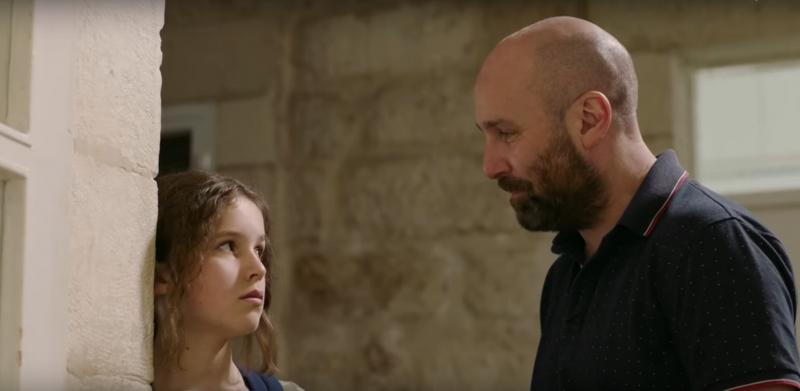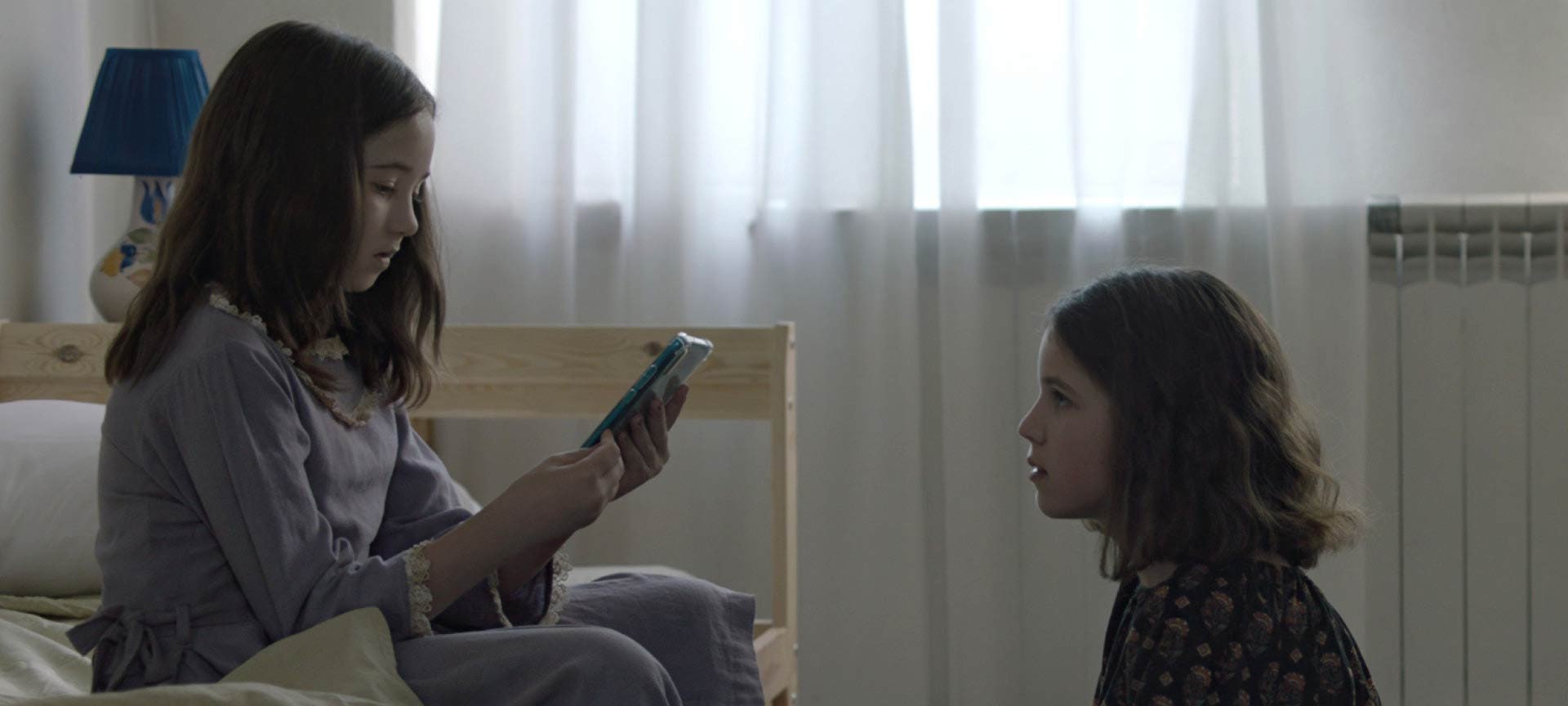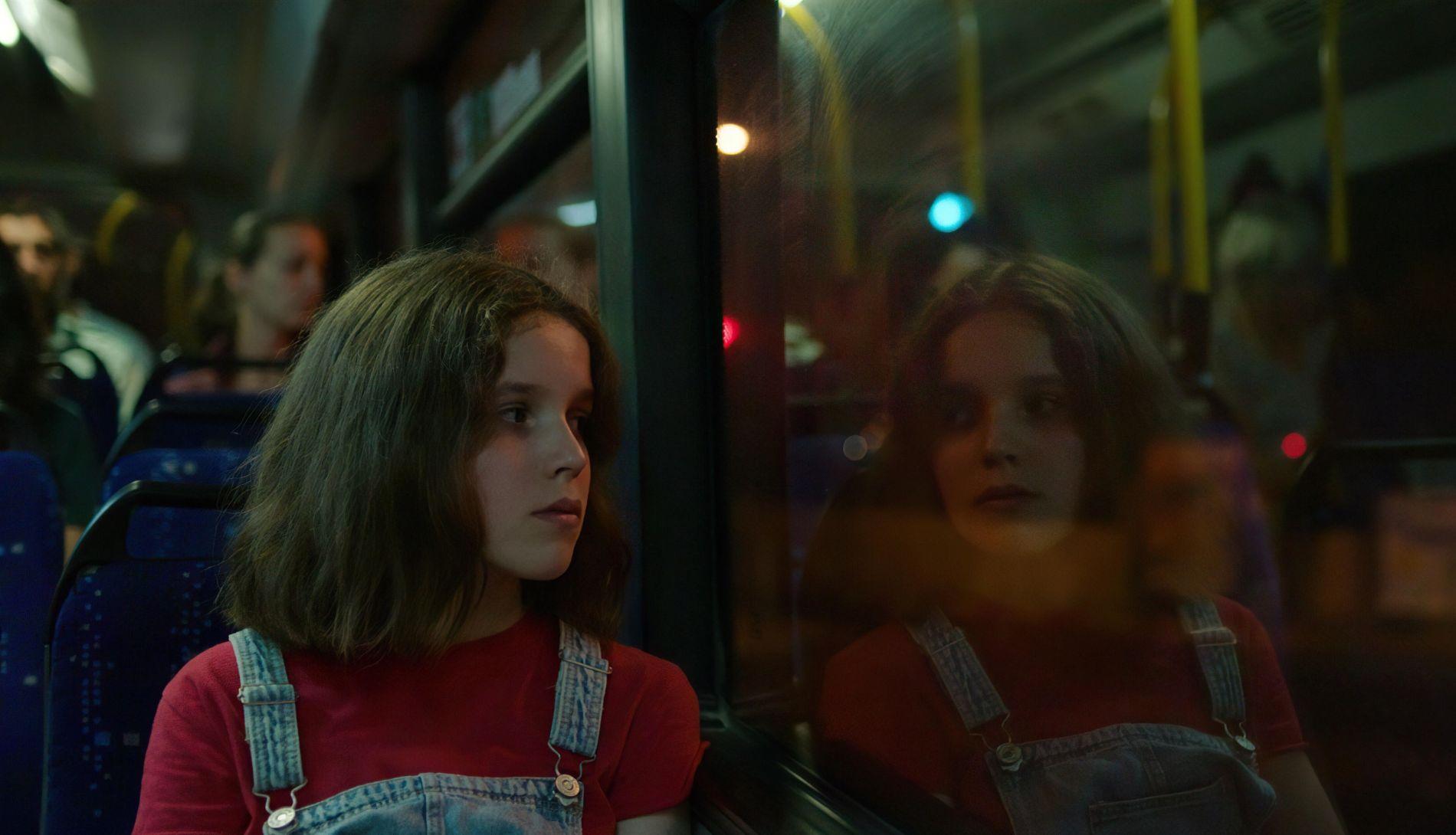A House in Jerusalem review - a haunted house and country | reviews, news & interviews
A House in Jerusalem review - a haunted house and country
A House in Jerusalem review - a haunted house and country
A grieving British girl gleans buried traumas in a quietly humane Middle East tale

The Israel-Palestine conflict aptly infuses a haunted house in Muayad Alayan’s story of layered loss. The Shapiro family home in Jerusalem which grieving British-Jewish husband Michael (Johnny Harris) and daughter Rebecca (Rebecca Calder) retreat to as a sanctuary already bears the pain of past Palestinian owners, as ghost stories multiply.
This is a girl’s adventure story from 10-year-old Rebecca’s perspective, as she longs for her mum, dead in a car crash in which Rebecca was a passenger, hurt repressed by her dad. “I keep trying to hide everything that might trigger her past,” he tells a school psychiatrist. Rebecca meanwhile glimpses another girl, Rasha (Sheherazade Makhoul Farrell, pictured below left with Calder), who flits through the house, invisible to Michael, and lives down its well. Michael, given muscular presence by Shane Meadows regular Harris and very English in Jerusalem’s more daunting milieu, seeks to move on with a new romance, and remains blind to Rebecca’s haunting. Curiously wandering this strange terrain, his daughter moves ghost-like through the city, innocently impervious to its shibboleths and borders. Seeking Rasha’s lost family, she slips by bus into the West Bank’s Bethlehem, smuggling herself through checkpoints with Christian pilgrims, and is welcomed as a child, not a Jew.
Michael, given muscular presence by Shane Meadows regular Harris and very English in Jerusalem’s more daunting milieu, seeks to move on with a new romance, and remains blind to Rebecca’s haunting. Curiously wandering this strange terrain, his daughter moves ghost-like through the city, innocently impervious to its shibboleths and borders. Seeking Rasha’s lost family, she slips by bus into the West Bank’s Bethlehem, smuggling herself through checkpoints with Christian pilgrims, and is welcomed as a child, not a Jew.
Palestinian Alayan and regular, sibling co-writer Rami Alayan offer a sympathetic but searching perspective on a place where the past is both national rationale and necessarily buried. The trapdoor over Rasha’s well is padlocked and concreted over, but its deep waters won’t be denied. Michael’s Israeli relatives discuss his dad’s lucky purchase of such a grand home when “the empty houses” were sold in the Sixties. But this domicile in the Valley of Ghosts was emptied by the 1948 Nakba, when Rasha hid underground. She still awaits her family’s return. Rebecca’s own English loss adds a parallel example of traumatised child ghosts held in place. An appealing middle-class Israeli life of wine-lubricated dinner parties and good schools, superficially familiar to the Shapiros, operates in sometimes ancient streets, like the crepuscular alleys and regular shops and families of Bethlehem’s forbidden zone. The act of forgetting such Israeli comfort requires, with the Occupied Territories as unquiet, walled-off Id, shadows Alayan’s film, without demonising individual beneficiaries. Attitudes to police also shift, first greeted by Michael as dutiful respondents to an apparent crime much as he would in the UK, only for Rebecca’s transgressions and Rasha’s memories of murder to harden their complexion. In Alayan’s wry, humane telling, the police have their problems too, run ragged by this pesky kid.
An appealing middle-class Israeli life of wine-lubricated dinner parties and good schools, superficially familiar to the Shapiros, operates in sometimes ancient streets, like the crepuscular alleys and regular shops and families of Bethlehem’s forbidden zone. The act of forgetting such Israeli comfort requires, with the Occupied Territories as unquiet, walled-off Id, shadows Alayan’s film, without demonising individual beneficiaries. Attitudes to police also shift, first greeted by Michael as dutiful respondents to an apparent crime much as he would in the UK, only for Rebecca’s transgressions and Rasha’s memories of murder to harden their complexion. In Alayan’s wry, humane telling, the police have their problems too, run ragged by this pesky kid.
The six million Holocaust ghosts which spurred Israel’s existence are a horror left for other films. A House in Jerusalem finds its sometimes reproachful soul in Rebecca’s bond with an elderly Bethlehem woman (veteran Souad Faress). The girl’s threading of a needle for her extends a hand across time. “The past hurts my head,” the woman anyway says.
Alayan wears her metaphorical conceit lightly, setting it in service of a broad yet intimate story of unresolved tragedy. The apocalyptic scale of inhumanity since October 7 doesn’t discount her quietly resonant tale.
rating
Explore topics
Share this article
The future of Arts Journalism
You can stop theartsdesk.com closing!
We urgently need financing to survive. Our fundraising drive has thus far raised £49,000 but we need to reach £100,000 or we will be forced to close. Please contribute here: https://gofund.me/c3f6033d
And if you can forward this information to anyone who might assist, we’d be grateful.

Subscribe to theartsdesk.com
Thank you for continuing to read our work on theartsdesk.com. For unlimited access to every article in its entirety, including our archive of more than 15,000 pieces, we're asking for £5 per month or £40 per year. We feel it's a very good deal, and hope you do too.
To take a subscription now simply click here.
And if you're looking for that extra gift for a friend or family member, why not treat them to a theartsdesk.com gift subscription?
more Film
 London Film Festival - from paranoia in Brazil and Iran, to light relief in New York and Tuscany
'Jay Kelly' disappoints, 'It Was Just an Accident' doesn't
London Film Festival - from paranoia in Brazil and Iran, to light relief in New York and Tuscany
'Jay Kelly' disappoints, 'It Was Just an Accident' doesn't
 Iron Ladies review - working-class heroines of the Miners' Strike
Documentary salutes the staunch women who fought Thatcher's pit closures
Iron Ladies review - working-class heroines of the Miners' Strike
Documentary salutes the staunch women who fought Thatcher's pit closures
 Blu-ray: The Man in the White Suit
Ealing Studios' prescient black comedy, as sharp as ever
Blu-ray: The Man in the White Suit
Ealing Studios' prescient black comedy, as sharp as ever
 The Woman in Cabin 10 review - Scandi noir meets Agatha Christie on a superyacht
Reason goes overboard on a seagoing mystery thriller
The Woman in Cabin 10 review - Scandi noir meets Agatha Christie on a superyacht
Reason goes overboard on a seagoing mystery thriller
 London Film Festival 2025 - crime, punishment, pop stars and shrinks
Daniel Craig investigates, Jodie Foster speaks French and Colin Farrell has a gambling habit
London Film Festival 2025 - crime, punishment, pop stars and shrinks
Daniel Craig investigates, Jodie Foster speaks French and Colin Farrell has a gambling habit
 I Swear review - taking stock of Tourette's
A sharp and moving tale of cuss-words and tics
I Swear review - taking stock of Tourette's
A sharp and moving tale of cuss-words and tics
 A House of Dynamite review - the final countdown
Kathryn Bigelow's cautionary tale sets the nuclear clock ticking again
A House of Dynamite review - the final countdown
Kathryn Bigelow's cautionary tale sets the nuclear clock ticking again
 theartsdesk Q&A: Idris Elba on playing a US President faced with a missile crisis in 'A House of Dynamite'
The star talks about Presidential decision-making when millions of lives are imperilled
theartsdesk Q&A: Idris Elba on playing a US President faced with a missile crisis in 'A House of Dynamite'
The star talks about Presidential decision-making when millions of lives are imperilled
 Urchin review - superb homeless drama
Frank Dillane gives a star-making turn in Harris Dickinson’s impressive directorial debut
Urchin review - superb homeless drama
Frank Dillane gives a star-making turn in Harris Dickinson’s impressive directorial debut
 Mr Blake at Your Service review - John Malkovich in unlikely role as an English butler
Weird comedy directed by novelist Gilles Legardinier
Mr Blake at Your Service review - John Malkovich in unlikely role as an English butler
Weird comedy directed by novelist Gilles Legardinier
 Don't Let's Go to the Dogs Tonight review - vivid adaptation of a memoir about a Rhodesian childhood
Embeth Davidtz delivers an impressive directing debut and an exceptional child star
Don't Let's Go to the Dogs Tonight review - vivid adaptation of a memoir about a Rhodesian childhood
Embeth Davidtz delivers an impressive directing debut and an exceptional child star

Add comment